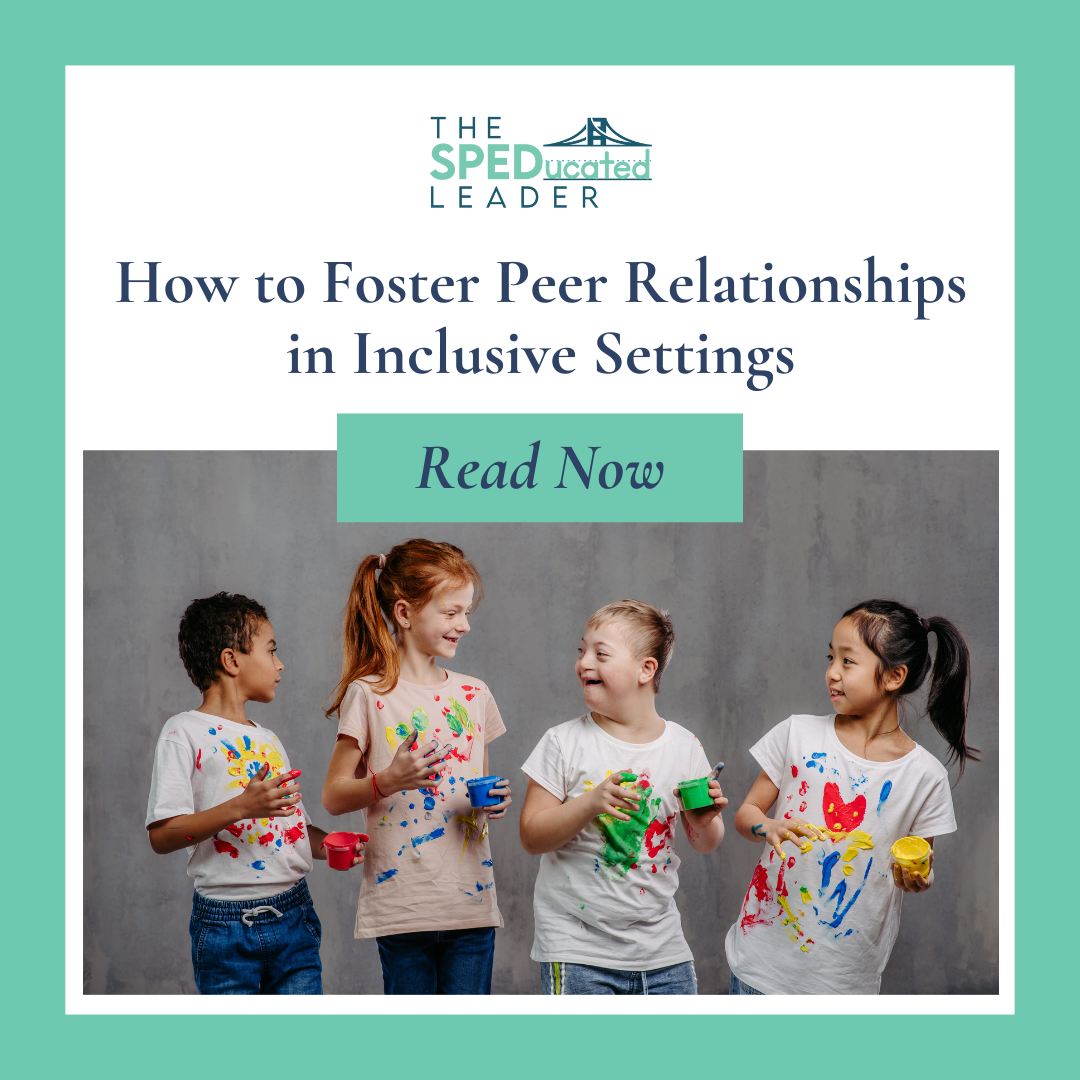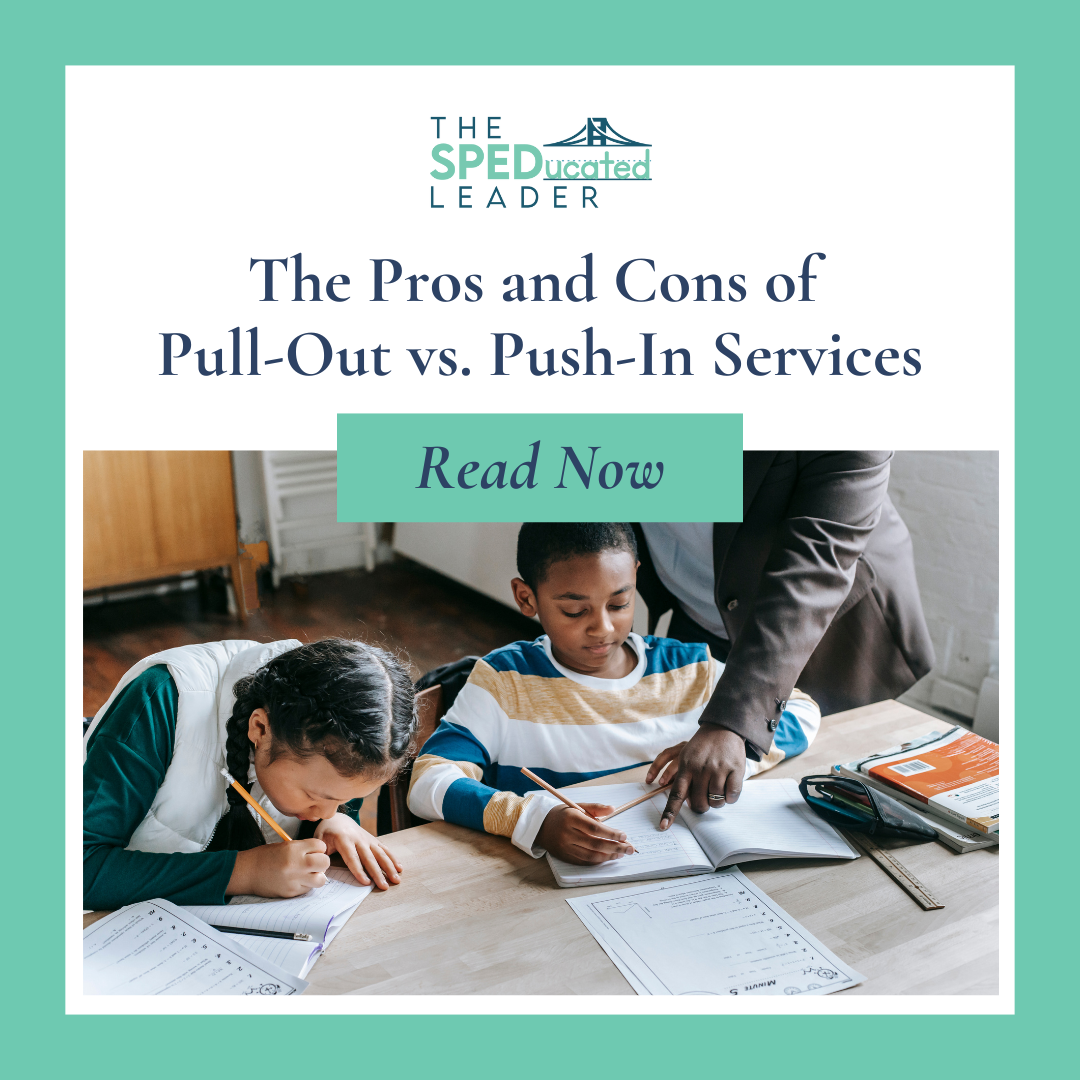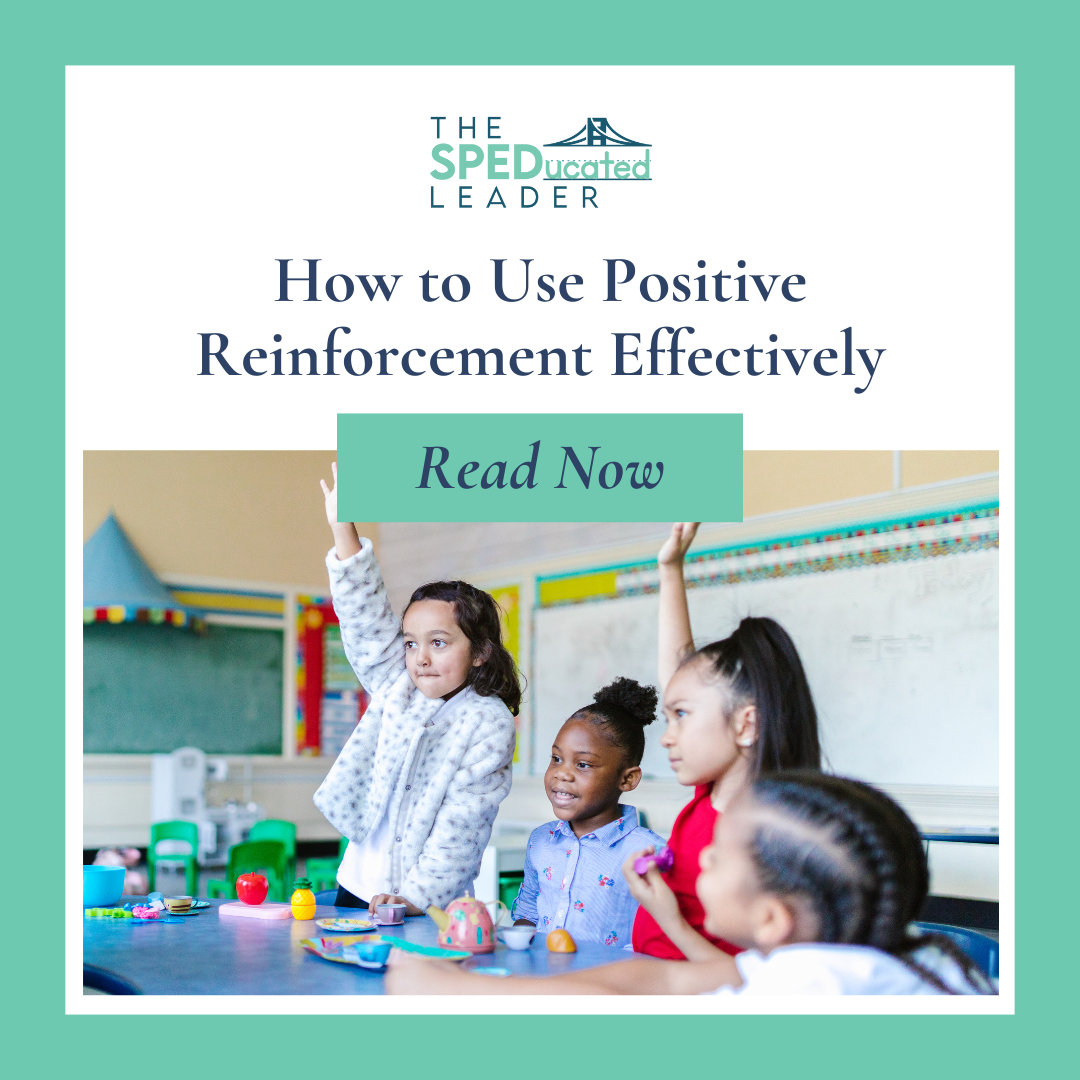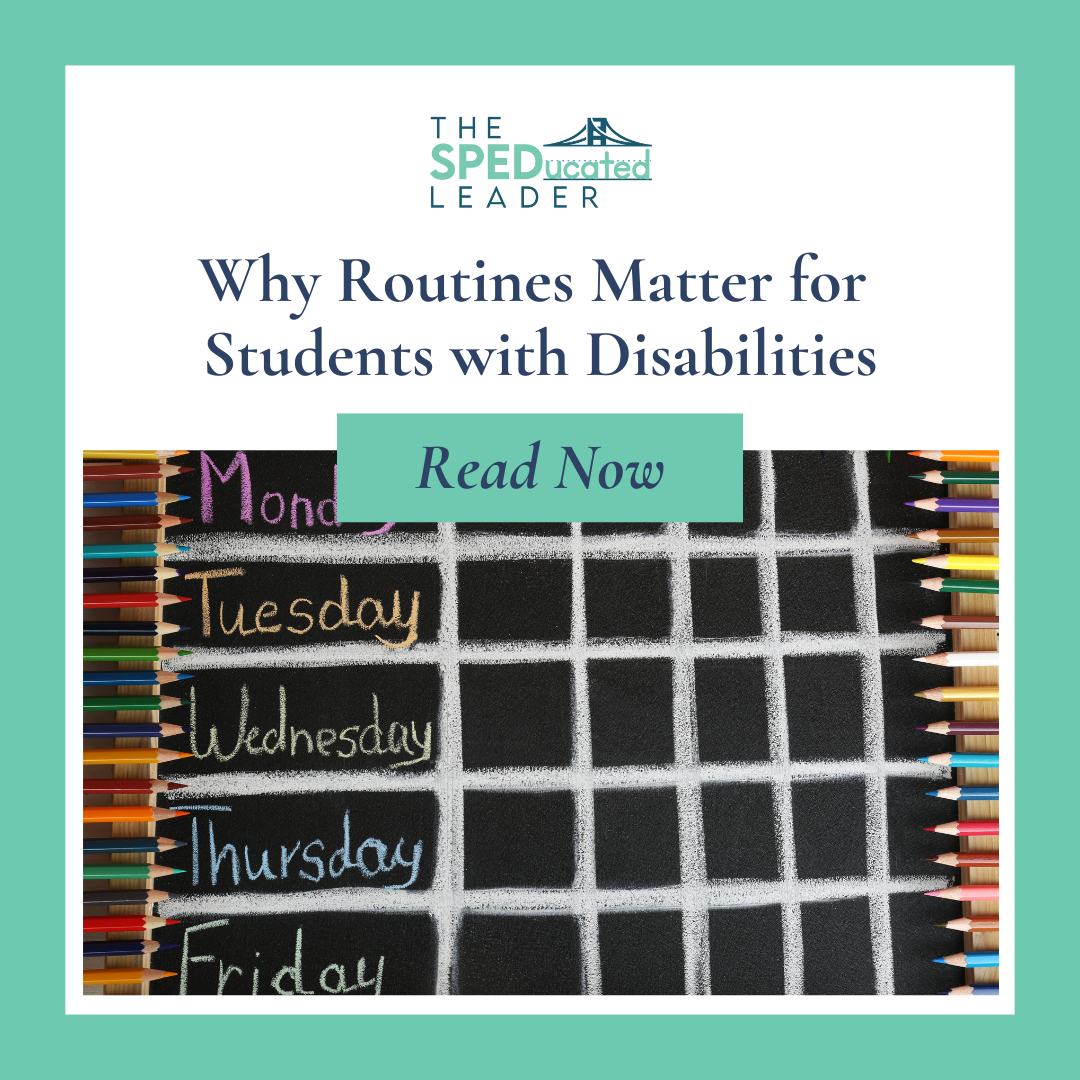SPEDucated Leader Blog
Dive into practical strategies, expert insights, and actionable resources designed to empower educators and school leaders in special education. From inclusive teaching practices to behavior management and beyond, our blog equips you with the tools to create equitable and effective learning environments for all students. Join the conversation and transform how you support your students today!

Understanding the Difference Between Compliance and Quality in IEPs
It’s possible to check every box on an IEP and still miss the mark.
That’s the hard truth about special education paperwork. While compliance is essential—it’s legally required, after all—it isn’t the same as writing a high-quality, meaningful IEP that actually supports student growth. And too often, we confuse the two.

Small Group Instruction: How to Maximize Impact
Small group instruction can either be a game-changer or a time-filler. When it’s done right, students with disabilities get the focused support they need to thrive. But when it lacks direction, structure, or follow-through, it becomes just another rotating group that yields little return. So how do we make sure it’s the former?

How to Navigate Behavioral Challenges Without Escalation
Every educator has been there—faced with a student whose behavior is disruptive, defiant, or escalating quickly. The moment is tense. The room is watching. And your next move matters.

The Power of High Expectations for Students with Disabilities
It’s easy to spot when expectations are high in a classroom. You hear students being challenged. You see them reflecting, revising, and stretching themselves. There’s a belief in the air that growth is possible, from both teachers and students themselves.
But for students with disabilities, that belief isn’t always present. And often, it’s not because of the students—it’s because of us.

What to Do When Interventions Don’t Work
You’ve identified a need. You’ve put support in place. You’ve collected data, tracked progress, and followed the plan. But… the student still isn’t making gains.
Now what?
It’s a frustrating but common reality in special education and intervention work: sometimes, what we put in place doesn’t work. And while it can be tempting to double down or move the student to a more restrictive setting, it’s worth pausing to ask: Have we done everything we can to understand what’s going on?
When an intervention isn’t producing results, it’s not always about effort. Often, it’s about alignment.
This blog details what to do when a student isn’t responding to support.

How to Foster Peer Relationships in Inclusive Settings
Inclusion is about more than just physical placement. A student with disabilities can sit in a general education classroom all day and still feel completely disconnected. True inclusion happens when students are not just present—but seen, valued, and part of the social fabric of the classroom. And that starts with relationships.

The Pros and Cons of Pull-Out vs. Push-In Services
One of the biggest decisions schools face when designing special education supports is how to deliver services: in the general education classroom (push-in) or in a separate setting (pull-out). Both models aim to meet students’ needs, and both have their place. But choosing between them shouldn’t be about what’s most convenient, it should be about what’s most effective.
Let’s break down the benefits and challenges of each approach, and more importantly, what factors should guide the decision-making process.

How to Use Positive Reinforcement Effectively
Let’s clear something up: positive reinforcement is not bribery, fluff, or only for early learners. When used well, it’s a powerful tool educators have to shape behavior, build motivation, and help students, especially those with disabilities, develop habits that lead to long-term success.

Why Routines Matter for Students with Disabilities
In most classrooms, routines are a helpful way to keep things moving. But in special education, routines are far more than a convenience, they’re a critical support. For students with disabilities, predictable structure isn’t just comforting, it’s often the key to accessing learning, managing behavior, and feeling safe in their environment.
When routines are clear and consistent, students know what to expect. They understand the flow of the day, how to transition between tasks, and what is expected of them in each setting. For many students, especially those with autism, ADHD, or anxiety, this predictability helps reduce stress, increase independence, and support emotional regulation.

The Importance of Executive Function Skills for Academic Success
When we think about student success, we often focus on content knowledge—can they solve equations, write a five-paragraph essay, or explain the water cycle? But behind every completed assignment, every raised hand, and every organized binder lies something even more critical: executive function.

What Administrators Need to Know About Supporting Special Educators
Special educators wear a lot of hats. They are case managers, co-teachers, compliance officers, collaborators, behavior specialists, and often emotional anchors for both students and colleagues. And while their work is critical to ensuring students with disabilities receive the services they are entitled to, it can also be isolating, overwhelming, and unsustainable without intentional support.

The Link Between Self-Regulation and Academic Achievement
We often talk about academic success in terms of skills like reading comprehension, math fluency, or content knowledge. But beneath all of that lies something less visible and often overlooked: self-regulation. For students with disabilities, and honestly, for all learners, self-regulation can be the difference between simply knowing something and being able to demonstrate it.

The Importance of Consistency Across Multiple Teachers
For students with disabilities, consistency isn't just beneficial—it’s essential. Many rely on clear expectations, predictable routines, and stable environments to feel secure and access learning effectively. However, in today’s educational settings, students often interact with multiple teachers, support staff, and service providers throughout the day. While collaboration among these professionals is valuable, inconsistency can lead to confusion, anxiety, and setbacks in both behavior and academic progress.

Why Professional Development Often Misses the Mark in SPED
Professional development (PD) is meant to sharpen skills, deepen understanding, and ultimately help educators better serve students. But for many special educators—and general educators who support students with disabilities—PD often feels like a missed opportunity. It’s not that the intention isn’t there. The problem is that the content often isn’t relevant, the structure isn’t practical, and the unique realities of special education are rarely considered.

What Does True Equity Look Like in SPED?
Equity has become a buzzword in education, but for students with disabilities, it’s far more than a trend—it’s a necessity. True equity in special education (SPED) means ensuring every student has access to the supports, services, and opportunities necessary to thrive—not just academically, but socially and emotionally as well. While access is an important start, equity goes beyond presence. It requires intentional planning, inclusive practices, and a commitment to seeing students not only through the lens of their challenges but through the potential of their strengths.

The Role of Functional Behavior Assessments (FBAs) in Student Success
Behavioral challenges can be one of the biggest barriers to student success, especially for students with disabilities. When students struggle with disruptive, aggressive, or off-task behaviors, traditional discipline approaches often fail to address the root causes. This is where Functional Behavior Assessments (FBAs) play a crucial role. An FBA helps identify why a student engages in certain behaviors and provides the foundation for developing effective, individualized interventions.

Collaboration Hacks for Co-Teachers in SPED
Co-teaching in special education is both an opportunity and a challenge. When done effectively, it provides students with disabilities greater access to grade-level content while receiving the specialized instruction they need. Successful co-teaching requires strong collaboration, clear communication, and strategic planning between general and special education teachers. Without these elements, co-teaching can become disjointed, leaving students without the support they need.

Discipline Policies That Do More Harm Than Good
Effective discipline policies should create safe, supportive learning environments while addressing behavioral challenges in a way that promotes growth. However, many schools continue to rely on outdated or punitive discipline policies that often do more harm than good. Rather than improving student behavior, these approaches can disproportionately impact students with disabilities, reinforce cycles of disengagement, and push students further from academic success. Here’s a look at common discipline policies that fail students—and what schools can do instead.

What General Educators Should Know About Specialized Instruction
General educators play a crucial role in the success of students with disabilities. While special education teachers provide targeted support, general educators are often responsible for implementing accommodations, modifications, and inclusive teaching strategies. A strong understanding of specialized instruction helps bridge the gap between general and special education, ensuring all students receive the support they need to thrive.

Understanding Trauma-Informed Practices in SPED
In special education, educators often support students who face unique challenges, including the impact of trauma. Research shows that childhood trauma—stemming from abuse, neglect, loss, or other adverse experiences—can profoundly affect a child’s emotional regulation, cognitive abilities, and behavior. Trauma-informed practices recognize this reality and provide strategies to create safe, supportive, and nurturing environments where students can heal and thrive. For students in special education, these practices are not just helpful—they are essential. Understanding trauma and its effects is the first step toward creating inclusive classrooms that meet the needs of all students.
